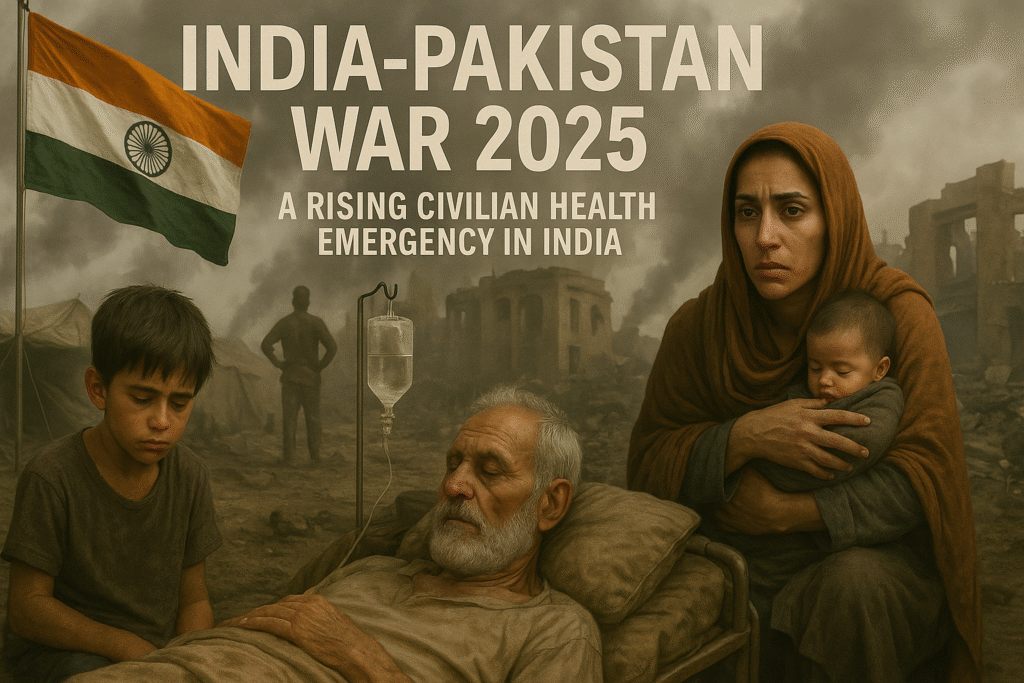
Civilian Displacement, Mental Health Collapse & Medical Crisis Along the Border
1. Civilian Displacement, Mental Health Collapse & Medical Crisis Along the Border
As the India-Pakistan war of 2025 continues to escalate, its devastating impact on civilians along the border is growing more severe. What began as a military confrontation has now evolved into a full-fledged humanitarian disaster, with thousands of innocent lives caught in the crossfire. The India-Pakistan war health impact is far-reaching, affecting the physical and mental wellbeing of civilians in the most affected areas.
In the border states of Jammu & Kashmir, Punjab, and Himachal Pradesh, families are fleeing their homes, losing access to basic healthcare, and enduring psychological trauma. The situation is dire, and the health crisis is unfolding in real-time. Here’s an in-depth look at the India-Pakistan war health impact on civilian health in India.
However, access to healthcare in these conflict zones is nearly impossible. Blocked roads, constant military surveillance, and the destruction of medical facilities have made it difficult for injured civilians to receive timely care. The India-Pakistan war health impact continues to worsen every day, as medical teams are unable to reach those in need.
2. Mental Health Crisis in Jammu & Kashmir
The Hidden Psychological Toll of War
Jammu & Kashmir, a region already grappling with the mental scars of years of conflict, is now facing a full-scale mental health crisis. The renewed violence has reopened old wounds, amplifying the psychological trauma among civilians. The India-Pakistan war health impact is disproportionately affecting mental health, as families cope with the trauma of violence.
Families are reporting disturbing symptoms among children, such as nightmares, insomnia, and panic attacks. Adults are exhibiting signs of severe depression, while young people displaced by the violence are experiencing suicidal thoughts. The India-Pakistan war health impact on mental health is devastating, and the region lacks the infrastructure to address it.
3. Internal Displacement and Health Breakdown
Overcrowded Relief Camps
Over 36,000 civilians have been evacuated from the conflict zones in Jammu, Samba, and Amritsar and are now living in temporary relief shelters. Unfortunately, these camps are severely overcrowded, suffering from poor sanitation, and lacking adequate food and water supply. The India-Pakistan war health impact is clear here as disease outbreaks are imminent, exacerbated by overcrowding and unsanitary conditions.
The growing risk of disease outbreaks due to overcrowding in relief camps is a serious concern. The summer heat, combined with dirty water sources and poor sanitation, is already causing widespread illnesses. Children and the elderly are particularly vulnerable, with cases of diarrhea, skin infections, and dehydration on the rise. If left unaddressed, a full-blown disease outbreak could devastate the affected populations, further underlining the India-Pakistan war health impact on these vulnerable communities.
4. Medical Cutoffs for Chronic Patients
Chronic Illnesses Become Life-Threatening
The breakdown of supply chains has left patients with chronic conditions — such as diabetes, hypertension, heart disease, and asthma — without access to essential medications. Many pharmacies in border areas are either shut down or have been looted, leaving thousands of individuals at risk of life-threatening complications. The India-Pakistan war health impact is increasingly visible as chronic patients face dire consequences.
Women and children are suffering the most in conflict zones, with maternal healthcare severely compromised. Many pregnant women are unable to access medical care, leading to high-risk deliveries without proper support. Additionally, childhood immunization programs have been halted, and rising cases of measles, malnutrition, and untreated infections are causing alarm among health experts.
5. Long-Term Health Consequences for Border Civilians
The Impact of War on Children’s Health
For children growing up in war zones, the long-term consequences could be severe. Chronic exposure to trauma and stress can affect their brain development, emotional regulation, and academic potential. Many children in these areas are developing chronic PTSD, anxiety disorders, and learning disabilities that will affect them for years to come. The India-Pakistan war health impact is particularly pronounced in children, whose futures may be forever altered by the violence and disruption.
Environmental Fallout
If critical infrastructure such as oil tanks, sewage systems, or chemical plants are struck, air and water contamination could devastate health for generations. Rural communities, already fragile, would bear the brunt of this environmental fallout, compounding the India-Pakistan war health impact in the affected regions.
What India Needs Right Now
The situation is dire, and India must act swiftly to prevent a generational health disaster. Immediate government action is needed to address the escalating India-Pakistan war health impact.
Immediate Government Action Required:
- Deploy mobile medical teams with trauma specialists to affected regions.
- Set up mental health emergency units in Jammu & Kashmir and Punjab to provide psychological support.
- Distribute essential supplies such as ORS, hygiene kits, and chronic disease medications to all relief camps.
- Ensure the safety of health workers and ambulances in conflict zones.
- Activate NGOs to provide both medical and psychosocial aid to the displaced population.
Survival & Basic Health Tips for Civilians in Conflict Zones
For those still waiting for help, here are some basic care strategies that can be implemented in war-affected areas:
First Aid
- Clean wounds with cooled boiled water.
- Use clean cloths and firm pressure to stop bleeding.
- Do not remove shrapnel; seek professional help immediately.
Clean Drinking Water
- Boil or filter water before drinking.
- Avoid drinking from stagnant or visibly contaminated sources.
- Use purification tablets if available.
Homemade ORS for Dehydration
To treat dehydration, mix the following ingredients:
- 1 litre of water
- 6 teaspoons of sugar
- ½ teaspoon of salt
Administer in small sips to children and the elderly.
Mental Wellbeing
- Offer emotional support to family members and neighbors.
- Practice breathing exercises to reduce stress and anxiety.
- Establish safe routines for children to provide a sense of normalcy.
Emergency Bag Essentials
Ensure you have the following items ready:
- Basic medications and first aid supplies
- Copies of identification, baby formula, and sanitary pads
- Flashlight, food, bottled water, and blankets
Conclusion: A Call for Courage and Compassion
This war is testing not just the strength of India’s military, but also the strength of its humanity. Every Indian — whether soldier or civilian — deserves life, safety, and dignity. The physical wounds inflicted by bullets may be visible, but the silent wounds of neglect can be just as deadly. The India-Pakistan war health impact is a reminder that we must act to protect the health and safety of civilians caught in this conflict.
Let this not be a forgotten war. Let us rise — not just in defense, but in compassion.
Spread Awareness | Save Lives
If you found this article valuable, share it with families, NGOs, and medical professionals. Use your voice to amplify the needs of the forgotten frontlines. Together, we can prevent a health catastrophe. Together, we stand for India.
Related blogs
Business Standard: Discusses the psychological toll of the conflict on civilians and offers expert advice on coping strategies.
Hindustan Times: Highlights the mental health challenges faced by civilians and provides tips to manage anxiety during the conflict.
✅ Visit SearchYourFitness.com
CLICK HERE TO READ US ON QUORA
YOUR NEEDS 😉
Click any tool below to explore and calculate instantly!


